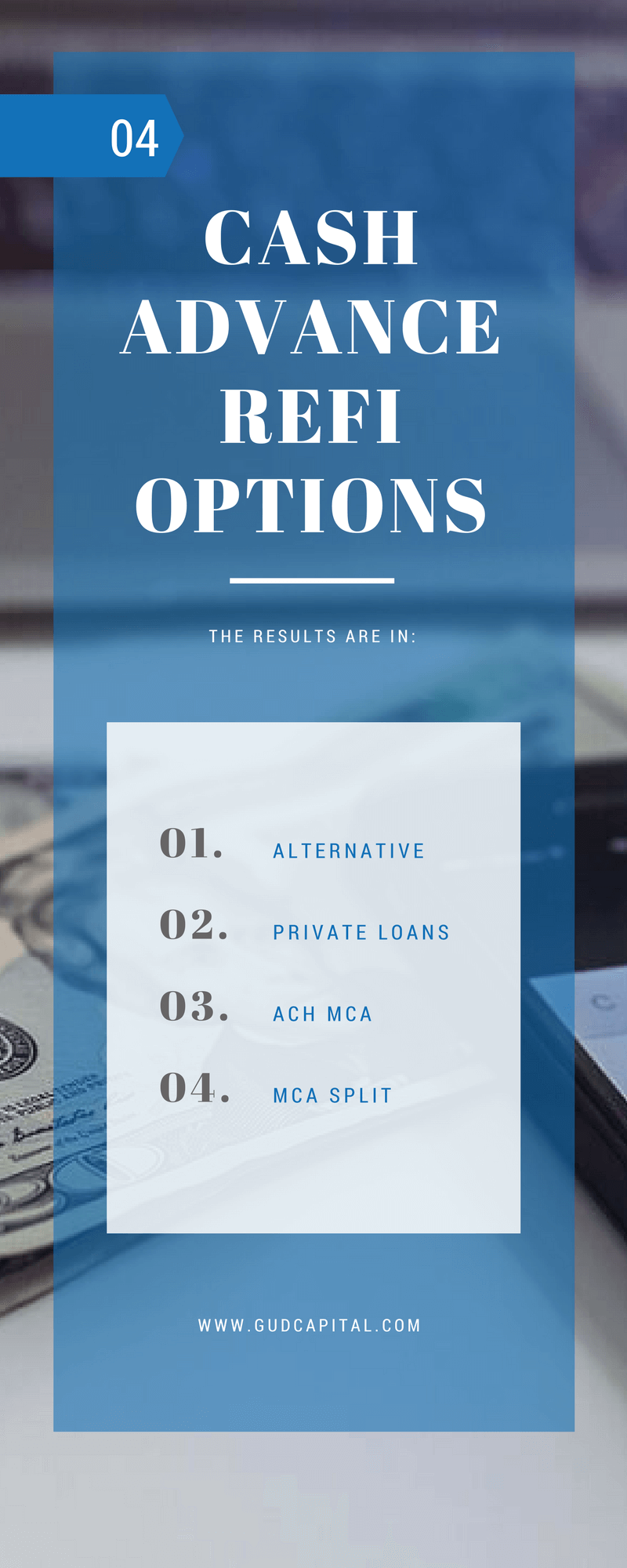Refinancing Merchant Cash Advances
Over the past few years the use of merchant and business cash advance funding has become more and more popular by small businesses that haven’t been able to get financing through more conventional means (like banks and credit unions). While cash advances are relatively easy for a business to obtain when they need fast financing, the overall cost of the funding may have both short and long-term side effects that may hurt the company’s cash-flow. If a company has multiple position cash advances, the daily strain to make repayments can strain a company’s ability to operate to the point they may have to shut-down. Small businesses that get advances often find that a MCA is easy to fund, but hard to get out of, which sometimes creates the need for more capital to help service the debt. This means taking on more debt, and increasing their debt payments – creating a vicious debt-trap cycle that a small business owner may find themselves unable to get out of. Thankfully, for small businesses that have taken-on a high-interest cash advance – or multiple cash advances – there are options to help escape this debt trap. We will discuss the merchant cash advance refinance options below.
What is a Business Cash Advance?
A cash advance (both a merchant and business cash advance) are a sort of specialized business financing that involves a company selling a portion of their future earnings to obtain immediate financing. In a sense, a cash advance is simply a way for a small business to get paid early (sometimes as far out as 21 months) based on the historical revenue produced by the company. The sale of this future revenue isn’t necessarily cheap, as a business may find themselves paying-back the full advance amount plus and additional 50%. Repayments for cash advances are usually made daily either through a daily remittance taken directly from the company’s bank account, or by splitting a portion of the business’s credit card transactions. ACH repayments are usually a set amount deducted each business day, Monday through Friday, whereas a MCA split takes a percentage of each day’s credit card processing sales. On days when credit card sales increase, a larger total amount will be split with the funder than on days when there are fewer credit card sales.
How Do You Get a Merchant Cash Advance?
Getting a cash advance is relatively easy, but the amount of funding requested and the particular situation can cause funding time to vary. With that having been said, a merchant cash advance almost always fund within three days of application, with most funding within a day or less after application is presented to the funder. After an approval, the funder will send the merchant terms of the offer they are willing to provide. If the merchant accepts the offer, the funder will send contracts to the borrower, as well as any stipulations required to fund. After the contracts are returned to the funder (as well as the list of stipulations) the funder will generally verify that the bank statements are legitimate, and then place a phone call to the borrower to go over the terms of the agreement. After the funding call is completed, the funds are then wired directly into the small business bank account.
What are a Business Cash Advances Uses?
Merchant cash advances can be used for nearly every business use that makes sense. Common uses include:
- Working capital:
- Expansion
- Payroll
- Repairs
- Emergency uses
- Inventory
- Marketing
Now, while a cash advance company will rarely care about how the money is being put-to-use, its not realistic to think a merchant cash advance would be a good option for purchasing a business, purchasing commercial real estate and other business property or other long-term financing uses. Cash advances are usually just used for short-term financing uses by businesses with poor credit, lack of credit history, lack profitability, or just don’t have the time to wait for a bank to fund.
When Does a Business Need to Refinance a Cash Advance?
Most companies would like to refinance a merchant cash advance sooner than later, once the daily payments start being made. Since cash advances are so easy to obtain, they can often be used for bridge funding purposes, but if the cash advance isn’t quickly replaced with healthier, more sustainable financing, they small business may soon find itself in a terrible cash crunch. Therefore, once funding for a merchant cash advance occurs, the company should immediately look to MCA refinancing into a better option. By simply extending the terms of a cash from four to twelve months, they may reduce their effective daily debt repayment by as much as two-thirds. Granted, the principal isn’t reduced (in fact, it may be increased by refinancing your cash advance), the ability to repay advance(s) may be made much easier by refinancing.
What are the Differences Between Refinancing and Consolidating Cash Advances?
While a refinance of your MCA may reduce the overall daily payments, refinancing and consolidating cash advances are two separate financing options. Where refinancing solely looks to increase the term of the advance, or reduce the factor rate of the advance, a consolidation is combining two or more advances into a single advance or business loan. Now, with that having been said, its possible to both consolidate and refinance multiple cash advances into a financing facility that is more sustainable.
What are the Cash Advance Refinancing Options?

- Alternative Loans: primarily provided by online fintech business lenders, an alternative business loan is a form of financing that is much easier to qualify for than if you sought funding from a bank, credit union or SBA lender. While their rates aren’t bank-rate, alternative lenders to offer funding that is much more affordable than a cash advance, with terms ranging from 2-5 years.
- Private Loans: non-bank lenders have funding options that can consolidate up to $2 million in cash advances if the company has the right profitability. Minimum funding amounts need to be at least $100,000 and the business has to agree to refrain from taking future cash advances. If they agree, they could get terms up to 30 months, with monthly payments.
- ACH: refinancing your advance with another advance is an option for companies that have paid-off around 50% of their current advance, and have a solid payment history. But understanding the common rule that the most you’ll qualify for is about 150% of your average monthly revenues.
- MCA Split: the most common form of cash advance these days are ACH merchant cash advances. But if your company has strong credit card sales, you may be able to leverage those sales into a quality refinancing option by switching to a MCA split. By using this program you are reducing the risk to the funder, therefore may find yourself getting better rates and terms than with an ACH.

Conclusion
While we recommend not taking a merchant cash advance in the first place, if you do happen to take one or additional positions, we recommend either refinancing or consolidating immediately. Refinancing should always begin with the healthiest of options and work-down from there. Unfortunately, one option that won’t be available to help a small business owner refinance and/or consolidate merchant cash advance is SBA lending, since the SBA essentially prohibits lenders from consolidating merchant advances. Therefore, try to avoid MCAs at all costs. But if you must take a cash advance, make sure you refinance the MCA as quickly as possible, so as to avoid doing damage to your company.




















